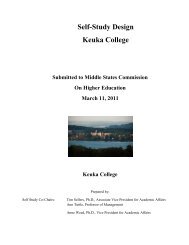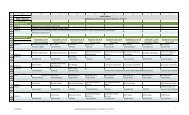final version of the self-study document - Keuka College's Middle ...
final version of the self-study document - Keuka College's Middle ...
final version of the self-study document - Keuka College's Middle ...
You also want an ePaper? Increase the reach of your titles
YUMPU automatically turns print PDFs into web optimized ePapers that Google loves.
have now been changed. Given <strong>the</strong> newer Gen Ed assessment plan approach, <strong>the</strong><br />
instructors teaching <strong>the</strong> suite <strong>of</strong> courses in this learning goal will meet with a designated<br />
Curriculum Committee member to review <strong>the</strong>se data and determine <strong>the</strong> next steps for<br />
improvement.<br />
Gen Ed Assessment Example: Freshman Writing Sequence Assessment Report<br />
Appendix 4.34 Writing Assessment Report details an assessment project by <strong>the</strong><br />
composition faculty to improve learning in <strong>the</strong> Gen Ed course ENG 112 College Writing<br />
I. This course focuses on <strong>the</strong> Gen Ed goals “Written Communication” and “Information<br />
Literacy.” Composition instructors, including both full time and adjunct faculty, read a<br />
sample <strong>of</strong> English 112 <strong>final</strong> research essays and scored <strong>the</strong>m using <strong>the</strong> <strong>Keuka</strong> Writing<br />
Rubric. The report details <strong>the</strong> overall strengths and weakness <strong>of</strong> <strong>the</strong> students’ writing<br />
competency, and based on <strong>the</strong> collected evidence, makes recommendations for changes.<br />
Last year’s assessment results and subsequent changes focused on improving students’<br />
ability to support <strong>the</strong>ir arguments:<br />
“Last year’s assessment work highlighted <strong>the</strong> struggles that students were having<br />
in two particular areas: support & development, and editing. With that in mind,<br />
writing faculty introduced several modifications to <strong>the</strong>ir courses designed to<br />
address <strong>the</strong>se (and o<strong>the</strong>r) deficiencies. In <strong>the</strong> first place, conversations among <strong>the</strong><br />
writing instructors point to a greater emphasis on spelling, punctuation, and<br />
grammar skills this year – skills which, in <strong>the</strong> past, we tended to assume that <strong>the</strong><br />
students should already have mastered. Instructors have also demonstrated a<br />
greater focus on improving development and support in <strong>the</strong> papers through<br />
techniques such as structured conference worksheets that require students to<br />
reflect on <strong>the</strong> appropriateness <strong>of</strong> <strong>the</strong>ir sources. The issue <strong>of</strong> organization is very<br />
closely related to this and some writing faculty have continued to make changes<br />
in order to improve students’ capacity for writing organized arguments: for<br />
instance, faculty have experimented with strategies such as reverse outlines and<br />
dedicating more conference time to <strong>the</strong> issue.”<br />
The information literacy assessment results led <strong>the</strong> composition faculty to suggest, among<br />
o<strong>the</strong>r things, a change in <strong>the</strong> assessment measure:<br />
“1. Rework <strong>the</strong> Information Literacy Exam. Faculty agreed that <strong>the</strong> Information<br />
Literacy Exam in its current form is an unsatisfactory measure <strong>of</strong> student<br />
achievement. It doesn’t measure what students can do, and analysis <strong>of</strong> <strong>the</strong> exam<br />
suggests that it has not kept pace with <strong>the</strong> sorts <strong>of</strong> skills that students need in an<br />
online research environment. However, <strong>the</strong>re was also agreement that an exam <strong>of</strong><br />
some sorts is both appropriate and necessary, and a more sophisticated exam will<br />
allow us to pinpoint specific areas <strong>of</strong> strength and weakness.”<br />
The <strong>final</strong> English 112 research essays provided a solid assessment opportunity, allowing<br />
for faculty to address more than one general education outcome with one artifact. In fact,<br />
a valuable finding for <strong>the</strong> composition faculty was <strong>the</strong> point that students are able to<br />
locate useful sources to support <strong>the</strong>ir arguments, that is, <strong>the</strong>y can access information<br />
effectively, but generally do not employ <strong>the</strong>m well or integrate <strong>the</strong>ir sources into <strong>the</strong>ir<br />
Page 15 <strong>of</strong> 31 Chapter 4: Inst. Effectiveness & Assessment




